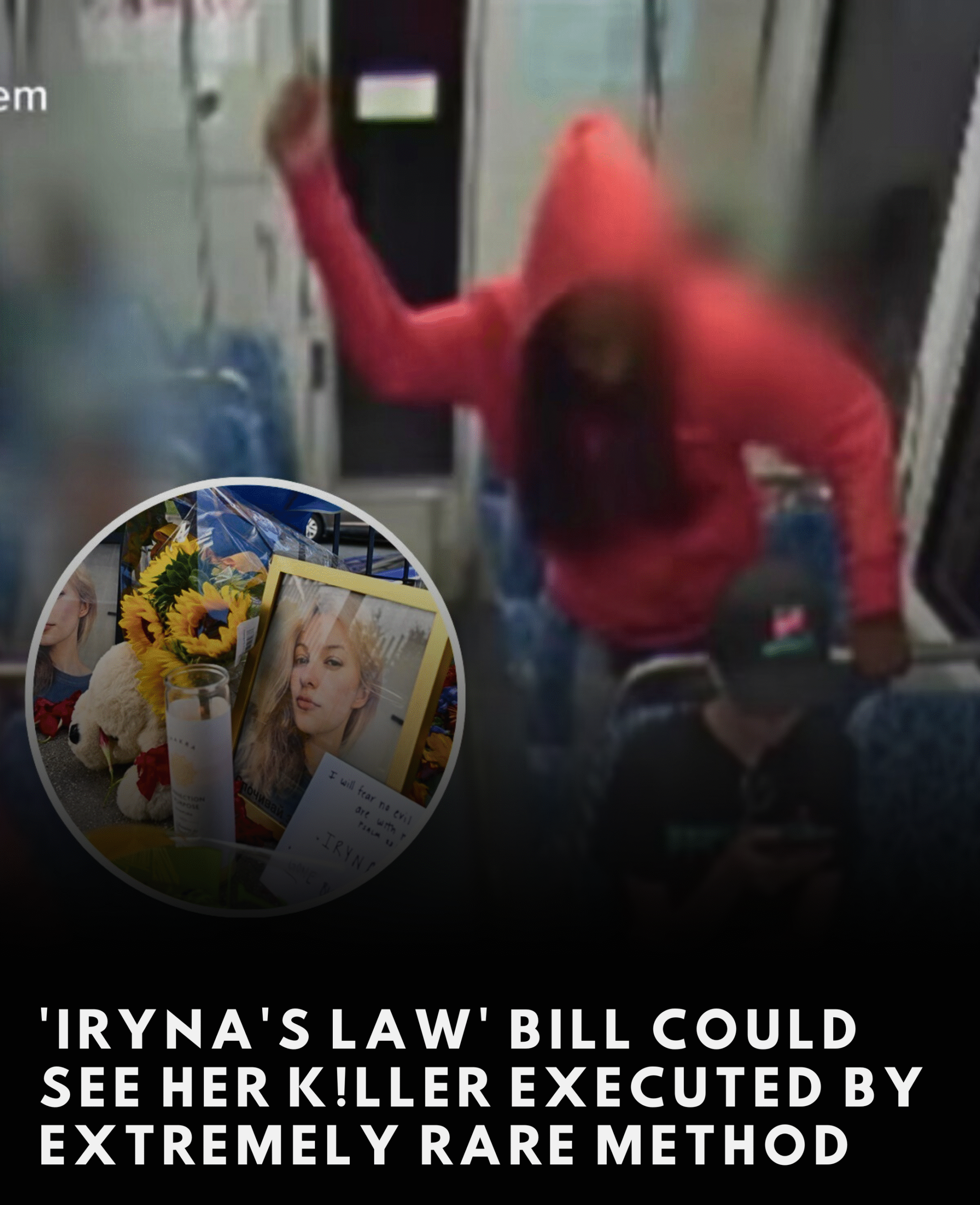North Carolina’s governor has signed a sweeping criminal justice bill named for Iryna Zarutska, a 23-year-old Ukrainian refugee fatally stabbed on a Charlotte light-rail train in August, legislation that accelerates capital appeals and directs officials to adopt an alternative execution method if lethal injection is struck down or unavailable—opening the door to rarely used techniques…
North Carolina’s governor has signed a sweeping criminal justice bill named for Iryna Zarutska, a 23-year-old Ukrainian refugee fatally stabbed on a Charlotte light-rail train in August, legislation that accelerates capital appeals and directs officials to adopt an alternative execution method if lethal injection is struck down or unavailable—opening the door to rarely used techniques in the United States. Governor Josh Stein, a Democrat, said he supports the bill’s bail and mental-health provisions but denounced the notion of resuming executions by firing squad, calling the method “barbaric” and vowing that it will not occur while he is in office.
House Bill 307—dubbed “Iryna’s Law”—passed the Republican-controlled legislature with bipartisan votes after graphic surveillance video of the Aug. 22 attack drew national attention and sharpened scrutiny of pretrial release policies in Mecklenburg County. Stein signed the measure on Oct. 3. Portions of the law take effect Dec. 1, including new rules ordering judges to scrutinize risk and mental-health concerns before setting bail in defined violent cases and an added aggravating factor that elevates punishment when a victim is attacked while using public transportation.
The law responds to the killing of Zarutska, who fled Kyiv with her mother and siblings in 2022 to escape Russia’s invasion and had been working at a Charlotte pizzeria while studying English. According to police and a federal affidavit, she boarded the Lynx Blue Line after work and sat in front of a man later identified as Decarlos Dejuan Brown Jr. Around 9:50 p.m., he rose and stabbed her three times from behind with a folding knife, including a fatal wound to the neck, before walking off the car and being arrested on the platform minutes later. She died at the scene.

Brown, 34, faces a state count of first-degree murder and a federal charge of committing an act causing death on a mass transportation system under 18 U.S.C. § 1992, an offense that can carry the death penalty. Announcing the federal complaint on Sept. 9, Russ Ferguson, the U.S. Attorney for the Western District of North Carolina, said, “This brutal attack on an innocent woman simply trying to get to her destination is an attack on the American way of life,” adding that Zarutska “deserves justice.” He remains held without bond while competence is evaluated.
Law enforcement records and local court timelines reviewed by news outlets show Brown had prior felony convictions, including armed robbery, and had been released on his own recognizance in January after a misdemeanor arrest—decisions that critics said reflected systemic gaps in assessing risk and mental illness. Under the new statute, magistrates and judges must order mental-health evaluations when defendants charged with specified violent offenses appear to pose a danger, and bail decisions in certain scenarios are reserved to judges who must consider criminal history and risk assessments.
The most contentious provisions involve capital punishment. North Carolina has not executed a prisoner since 2006 amid litigation over lethal-injection protocols, medical participation, and racial-bias claims in capital cases. While state law has long provided for death by lethal injection, “Iryna’s Law” amends the execution statute to require the Department of Adult Correction to choose another method adopted by any other state within 120 days if lethal injection is ruled unconstitutional by a North Carolina court or is not available—then to promptly establish protocols and schedule executions. The text does not name the alternative method, but it would permit adoption of practices authorized elsewhere, such as the firing squad or nitrogen hypoxia, depending on what other states use and what courts allow.
In public remarks the day he signed the bill, Stein said legislators “sprung a last-minute amendment that aims to bring about execution by firing squad in North Carolina,” adding, “There will be no firing squads … during my time as governor.” Republican leaders have defended expanding methods as a way to restart executions after nearly two decades of legal gridlock. Senate leader Phil Berger said last month he wanted to undo what he described as a “judicially imposed moratorium,” part of a broader GOP push to accelerate death-penalty cases after the light-rail killing.

The law also shortens capital appellate timelines, directing that death-penalty appeals be heard on an expedited schedule, and allows the state’s chief justice to suspend magistrates for cause. In addition, the statute writes into law an aggravating factor specifically tied to the circumstances of Zarutska’s case: if the victim was using a “public transportation system,” prosecutors may cite it in seeking a death sentence. Those measures were promoted by supporters as targeted fixes to address what they characterized as failures that kept a dangerous, untreated offender on the streets and left transit riders exposed.
Federal charging papers detail the attack and its aftermath, including footage reviewed by investigators that shows Brown seated behind Zarutska shortly before he unfolded a pocketknife and struck from behind. Officers recovered a knife at the scene. The U.S. Attorney’s office said the federal count carries a penalty of life or death if convicted, with any sentence determined by a judge after the required statutory findings and a jury determination on capital punishment in a separate phase. (Department of Justice)
Zarutska’s family described her as industrious and optimistic, a young woman who embraced life in North Carolina and planned to continue her studies. A local obituary confirmed she was born in Kyiv in 2002 and had moved to the Charlotte area with her mother, sister and brother in 2022; her father remained in Ukraine due to wartime restrictions. Her colleagues at the pizzeria posted tributes and closed briefly in her memory. A verified fundraiser helped cover funeral and family expenses.
The attack intensified debate over Charlotte transit security. An Axios review found the system relies on open platforms and random fare inspections, with no turnstiles, and that the number of armed guards contracted by the agency had fallen since 2019 even as the overall security headcount grew. In response, the Charlotte Area Transit System said it would increase fare enforcement and deploy new patrols, while the mayor scheduled a resolution addressing fare evasion.
Republican lawmakers cited the case in calling for revival of capital punishment statewide. Earlier this year, separate House legislation proposed adding the electric chair and firing squad to North Carolina’s authorized methods, reflecting moves by other states grappling with drug shortages and medical-ethics constraints in lethal injection. Five states—Idaho, Mississippi, Oklahoma, South Carolina and Utah—authorize firing squads in some circumstances, according to nonpartisan tracking; Utah is the only state to have used the method in the modern era. North Carolina’s new law takes a different route by empowering corrections officials to select any method another state has adopted if courts or supply issues foreclose lethal injection.
Stein, who has urged lawmakers to pair tougher bail rules with broader investments in policing and mental-health services, framed his signature as a balance between what he supports and what he opposes. “I use one simple test,” he said, explaining his decision to sign: “Does it make people safer?” He said stricter scrutiny of risky defendants does, while promising to block any firing-squad executions during his term, which ends in January 2029.
Brown’s mental health has been a recurring issue in court filings. A superior-court judge ordered a 60-day psychiatric evaluation, and another judge later granted prosecutors’ request to obtain medical records. Local reporting indicates Brown had called 911 months before the killing alleging his brain waves were being controlled; his family told reporters he had been diagnosed with schizophrenia. Under “Iryna’s Law,” judicial officials are now required to order mental-health evaluations when a charged person is believed to pose a danger, a provision lawmakers said was designed to prevent similar cases from slipping through.
The legislation also addresses the role of magistrates, after attention focused on a January misdemeanor case in which Brown was released on a written promise to appear. The statute shifts certain release decisions for defendants on probation or with pending cases to judges, instructs courts to consider criminal history and risk assessments, and—in specific scenarios—requires secured bonds or GPS monitoring. Sponsors argued those changes will reduce the odds that repeat violent offenders cycle through on low-level charges and escalate to serious crimes before anyone intervenes.
Zarutska’s death drew responses from across the political spectrum and abroad. North Carolina officials condemned the attack; Ukraine’s government said it was in contact with U.S. authorities. The case also reverberated nationally as Republicans pressed for tougher pretrial rules and faster capital proceedings, while civil-liberties groups warned that compressed timelines and alternative execution methods heighten the risk of wrongful convictions and unconstitutional punishment. For now, the practical impact of the new law will turn on court rulings, supply realities for lethal-injection drugs, and who holds the governor’s office when any execution warrants are issued.
What is certain is that the case that gave the law its name will proceed on two tracks. In state court, prosecutors have charged Brown with first-degree murder, a capital offense if the jury unanimously finds the necessary aggravating circumstances. In federal court, prosecutors must decide whether to seek the death penalty under the statute that covers lethal attacks on mass-transit systems. The U.S. Attorney’s office has said only that the maximum penalty is life or death and that the defendant is presumed innocent unless and until proven guilty beyond a reasonable doubt.
Even as the broader policy debate intensifies, the statute’s most immediate provisions are geared to the front end of the justice system: who is held, who is released, and under what conditions. By codifying mental-health reviews and shifting key release decisions to judges for higher-risk categories, “Iryna’s Law” attempts to address the chain of events that culminated on a Charlotte train car. Whether those changes reduce violence without sweeping too broadly will be measured in cases that bear little resemblance to the one that spurred them. For the family and friends of the young woman who left Kyiv seeking safety, the focus remains on a prosecution still in its early stages and a legislative legacy that now carries her name into courtrooms and policy manuals across the state.



